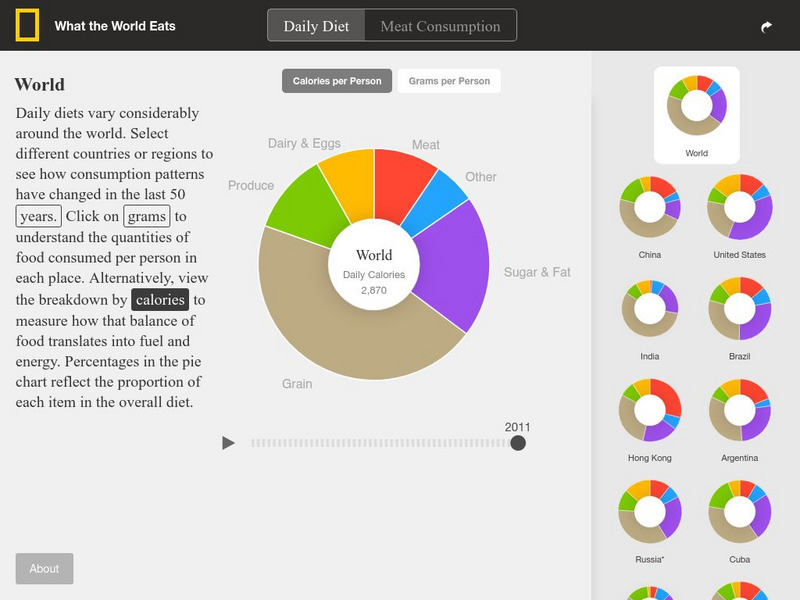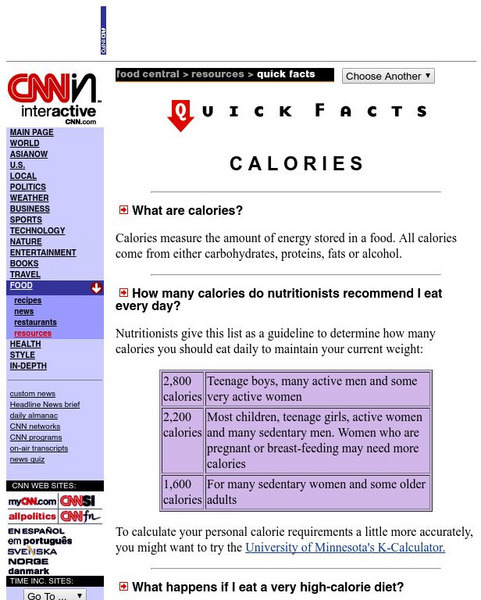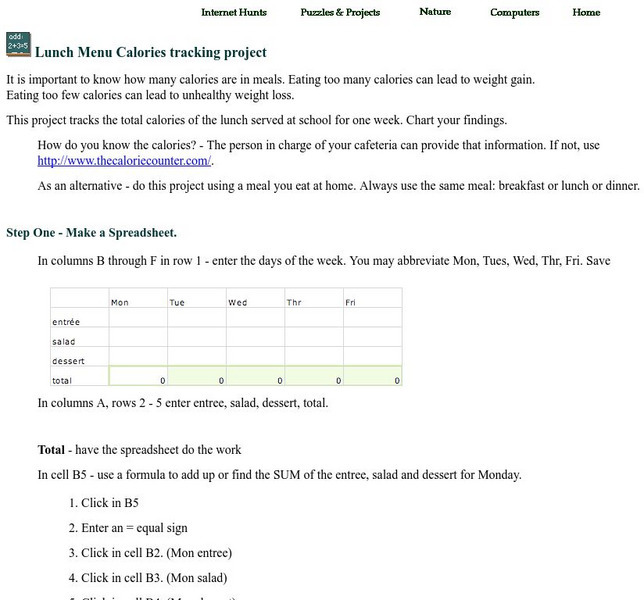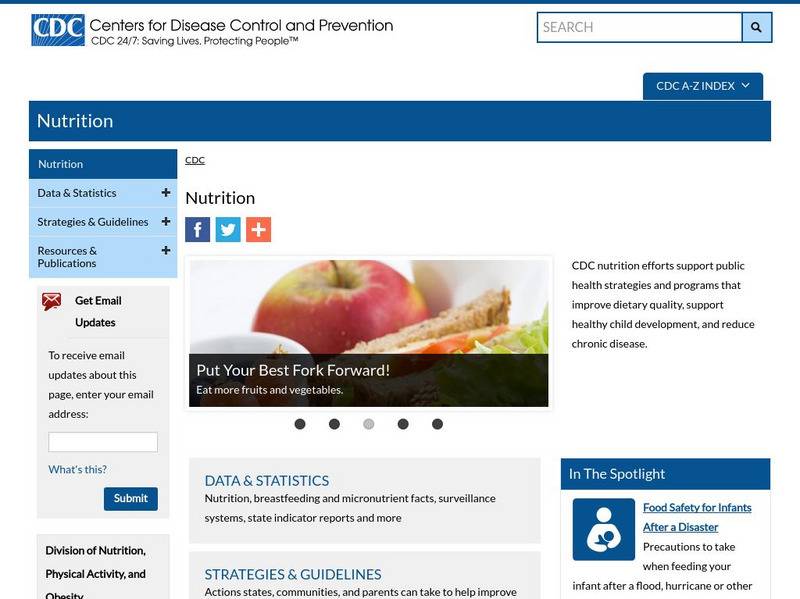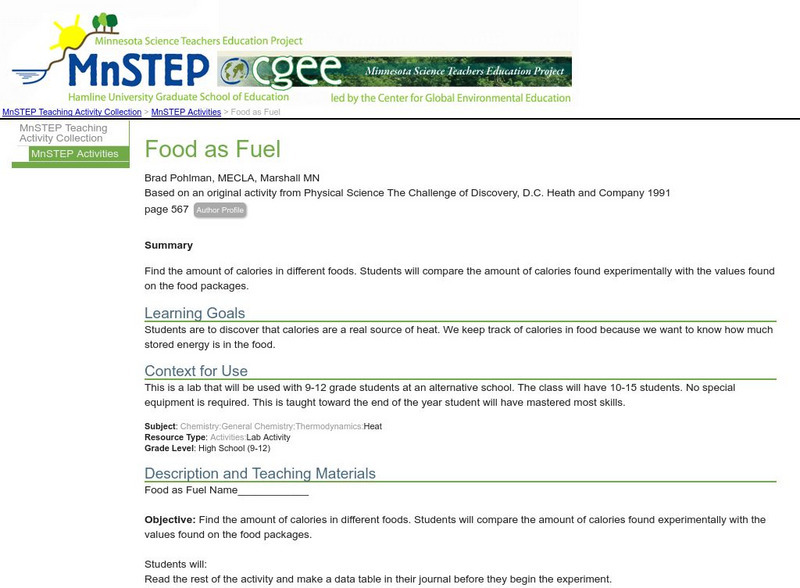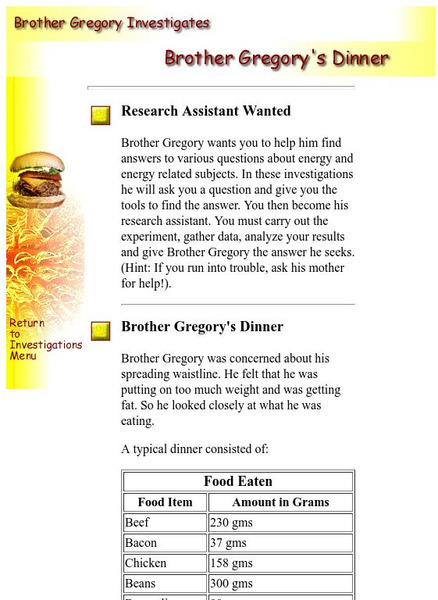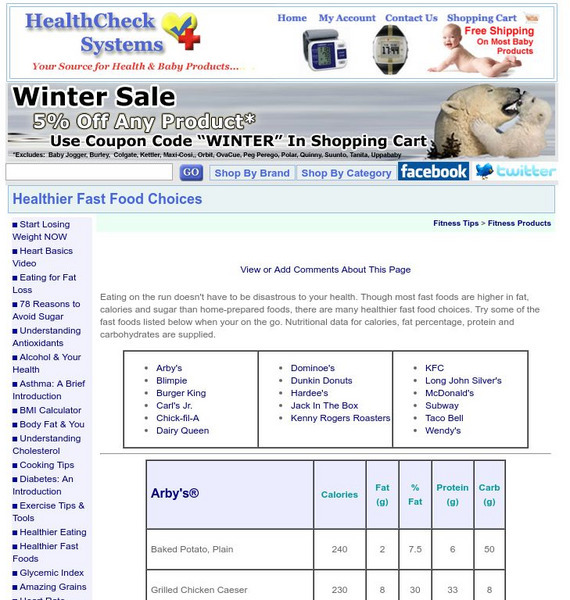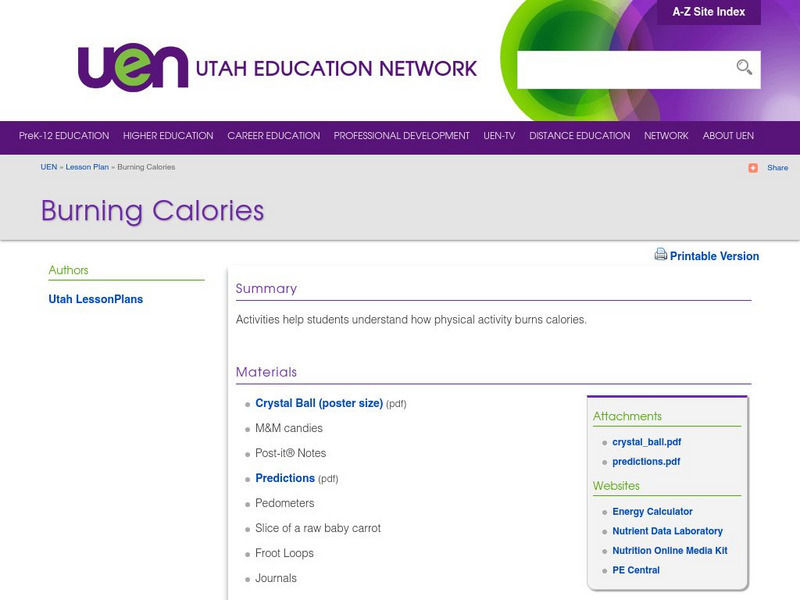Hi, what do you want to do?
Mayo Clinic
Mayo Clinic: Energy Density & Weight Loss:feel Full on Fewer Calories
This article is medium-sized in length and provides great information on the subject. Links are provided for additional information as well.
US Department of Agriculture
Choose My Plate: Health and Nutrition Information for Educators
Find sets of lesson plans for children grades one through six about the healthy food choices. Includes posters, worksheets, and coloring pages.
PBS
Pbs Teachers: Fat and Happy?: Testing for Simple Sugars [Pdf]
Investigate different methods for testing the sugar content in foods, and determine relative amounts of sugar in several juices using a sugar indicator solution.
PBS
Pbs: Scientific American: Never Say Die: Eat Less Live Longer
This site from the PBS production "Never Say Die" provides a section on how to eat less and live longer. The first part of this site discusses food and nutrition. The second part is an activity in which you can make a calorimeter. The...
National Geographic
National Geographic: What the World Eats
This interactive website offers pie charts showing what the world eats and what 22 different countries eat. It also allows you to choose by year as well. These include food groups, calories, and grams overall and per category.
University of Colorado
University of Colorado: Ph Et Interactive Simulations: Eating and Exercise
How many calories are in your favorite foods? How much exercise would you have to do to burn off these calories? What is the relationship between calories and weight? Explore these issues by choosing diet and exercise and keeping an eye...
Michigan Reach Out
Newton's Apple: Body Fat
Through these lesson plans, investigate the different types of fat found in food and found in the human body. Discuss the functions and problems associated with dietary fat and make wise food choices based on what you learn about fat,...
CNN
Cnn: Quick Facts on Calories
How many calories should you eat a day? Just what is a calorie? What foods should I avoid? Click here and find the answers to these questions and more.
Cynthia J. O'Hora
Mrs. O's House: Lunch Menu Calories Tracking Project
Maintain a healthy diet to maintain a healthy weight. Students will track their meals for a week, entering the food and caloric intake. After collecting the data and reviewing the spreadsheet, lead students in discussions of the results.
US Food and Drug Administration
Fda: How to Understand and Use the Nutrition Facts Label
The FDA provides information relating to the nutrition facts panel overview, the serving size, calories, the nutrients, understanding the footnote, how the daily values relate to the percent daily values, the percent daily value, quick...
PBS
Pbs Teachers: Scientific American: Fat and Happy?: Counting Calories
Explore the concept of the calorie. Determine the calories/gram of the burned food by measuring its mass, and make conclusions about the experimental design.
Eastern Kentucky University
Eastern Kentucky University: Dietary Requirements of a Medieval Peasant
Notes from a university-level course about food and culture consider the food eaten by medieval European peasants and the calories expended in performing daily labors, for both men and women.
Centers for Disease Control and Prevention
Centers for Disease Control: Nutrition Introduction
The CDC offers a wealth of information regarding several specific topics that fall under nutrition including good health, exercise, diet and more.
Other
Fast Food Fun
Use your knowledge of spreadsheets to analyze the calories and fat content of fast food choices. This project gives links to a USDA site and a final report format. A sample spreadsheet and grading rubric is also provided.
Science Education Resource Center at Carleton College
Serc: Food as Fuel
Students find and compare the amount of calories found experimentally with the values found on the food packages.
City University of New York
Brother Gregory's Dinner: Food Energy Content
Use a virtual calorimeter to investigate the energy content of various foods. The background information is clear and easy to understand.
Other
Health Check Systems: Healthier Fast Food Choices
At this site from HealthCheck Systems you can click on the names of your favorite fast food places to see the "healthier" food choices they provide. Check out the calorie, fat, protein, and carbohydrate content for each food choice.
Utah Education Network
Uen: Burning Calories
Second graders will investigate calorie usage in this activity. Students will make predictions, wear a pedometer, walk and record steps, and understand how high calorie foods require more calorie-burning effort.
Indiana University
Area 10 Math and Technology Project: Nutrition Labels
Lesson Plan involving all aspects of reading a nutrition label. Emphasizes math skills. Includes links to a teacher outline, student copies and reference materials.
Science Buddies
Science Buddies: How Greasy Are Your Potato Chips?
One of America's favorite snacks is potato chips. Although potato chips are very tasty, some varieties are not very healthy for you. A typical 1-ounce (oz.) serving of a well-known national potato chip brand contains 150 calories, 90 of...
Other
My Food Buddy: Food Calorie Table
This page has a list of almost 1,000 different types of foods with their amount of calories, protein, fat, and carbohydrates.
Read Works
Read Works: Hot Topics: Hot News About Calories
[Free Registration/Login Required] An informational text about food, calories, and how the body makes energy. A question sheet is available to help students build skills in reading comprehension.
Texas Instruments
Texas Instruments: Holt Modern Chemistry: Energy Content of Foods
This probeware Lab Energy Content of Foods from the chapter Causes of Change uses a temperature probe to calculate the temperature change of the water to determine how much energy was released when food samples burn.
PBS
Pbs Teachers: Smarter Food Processing Techniques
Test your knowledge about the foods you eat by taking a short quiz. Match products to their ingredients, answer questions about nutritional values and compute the amount of fruits and vegetables consumed per year.





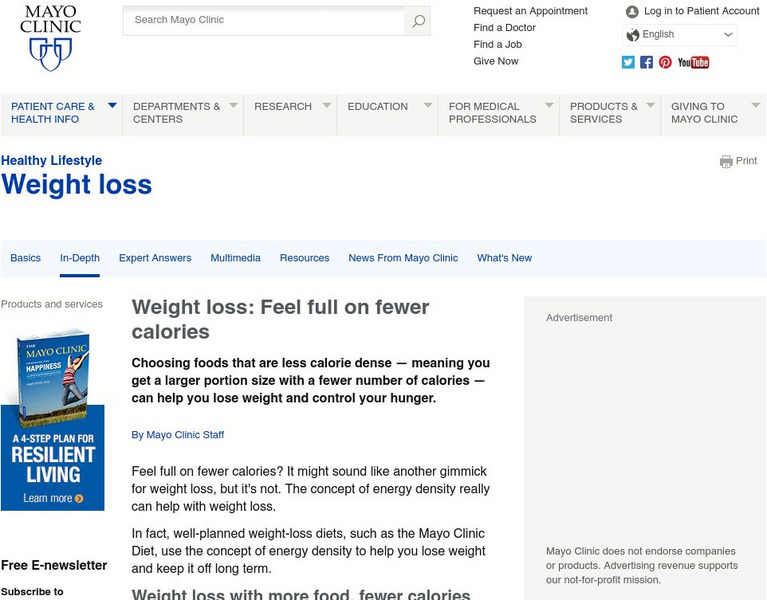

![Pbs Teachers: Fat and Happy?: Testing for Simple Sugars [Pdf] Activity Pbs Teachers: Fat and Happy?: Testing for Simple Sugars [Pdf] Activity](https://content.lessonplanet.com/knovation/original/67107-890ce2654cdf488a8c3f027b91fd4ae4.jpg?1661419049)

